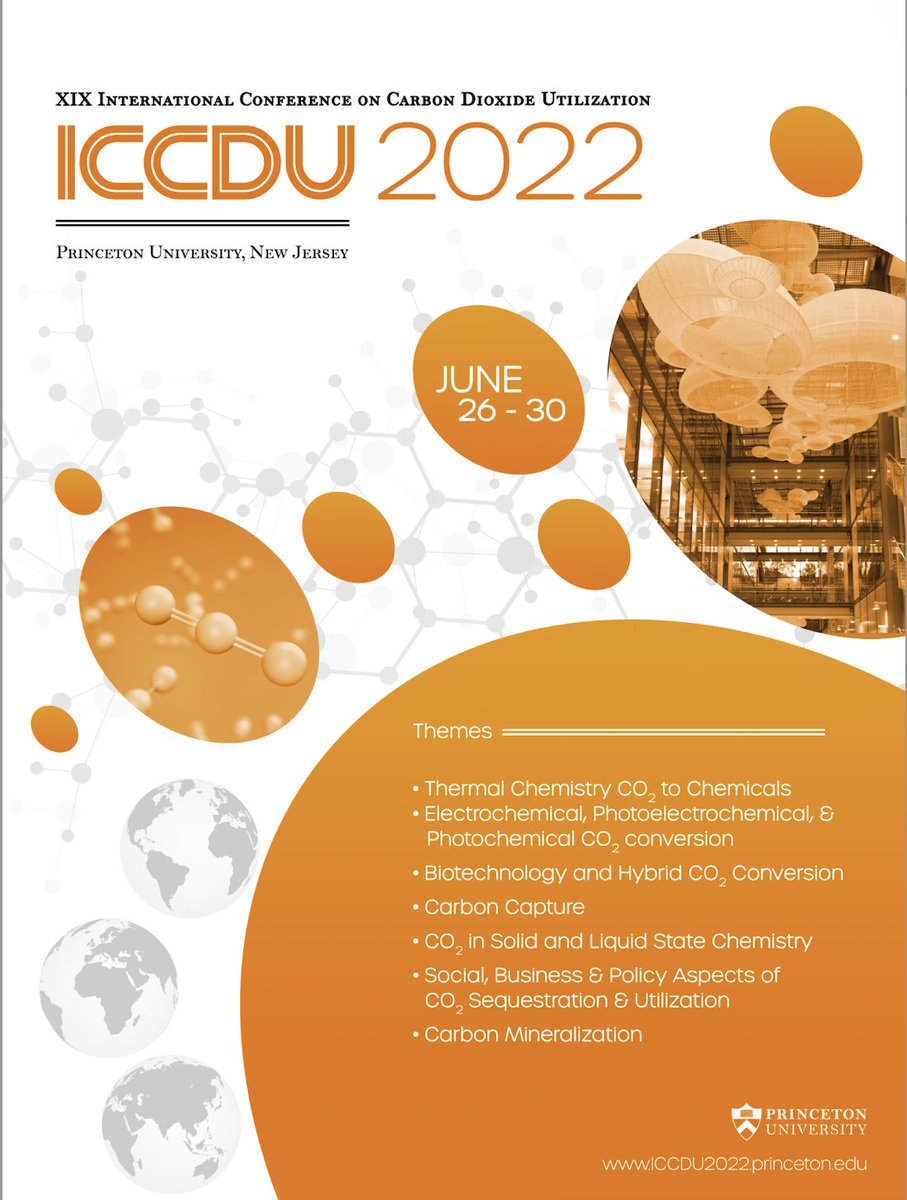Chemistry Hosts ICCDU, Long-Standing CO² Confab, at Princeton
The 19th International Conference on Carbon Dioxide Utilization, a gathering fueled by concerns about one of the great challenges facing the planet, will convene at Princeton University this month for the first time.
Historical approaches to CO2 uptake will mix with newer themes like entrepreneurship and startups as the conference plays out across five days, from June 26th to June 30th. Registration is required and will be accepted through June 13th.
Four plenary speakers, nine keynote speakers, and just under 100 international presenters will reflect the contributions of chemists, engineers, government labs, policy makers, and students.
An international forum for scientists and policy makers focused on the latest developments in CO2 capture and utilization, ICCDU is being hosted by Princeton’s Department of Chemistry, among other institutions.
The gathering maintains its international character by rotating meetings each year among Europe, Asia, and the Americas. The conference has not been held in the United States for nearly a decade.
 “When ICCDU was started 30 years ago, people were not so concerned about CO2 in the atmosphere and climate change as they are today, but it was anticipated by a bunch of insightful scientists. They said, this is going to be a big problem,” said Andrew Bocarsly, professor of chemistry at Princeton and chair of ICCDU22. “So now here we are, right in the middle of it.
“When ICCDU was started 30 years ago, people were not so concerned about CO2 in the atmosphere and climate change as they are today, but it was anticipated by a bunch of insightful scientists. They said, this is going to be a big problem,” said Andrew Bocarsly, professor of chemistry at Princeton and chair of ICCDU22. “So now here we are, right in the middle of it.
“At this conference, we’ll focus on both carbon capture – how do you get the CO2 out of the air – and on utilization, how do you turn it into something useful? The right answer is that you need to grow a whole field centered on this area of chemistry. That’s one of the things this conference does, and it does it internationally because there are different solutions for different parts of the world.”
To draw graduate students and postdocs into the field – and possibly impact the course of their future research – the ICCDU will provide live, virtual access to the plenary and keynote talks for this demographic. The conference is otherwise scheduled to be in-person.
Attendees will organize around seven broad themes: thermal chemistry CO2 to chemicals; electrochemical, photoelectrochemical, and photochemical CO2 conversion; biotechnology and hybrid CO2 conversion; carbon capture; CO2 in solid and liquid state chemistry; social, business and policy aspects of CO2 sequestration and utilization; and carbon mineralization.
For instance, Aryandokht Azari of the University of Michigan, will present on “Evaluating the Impact of Using Carbon-Negative Aggregates on the Carbon Footprint of Concrete Pavements.” The University of Michigan’s Global CO2 Initiative is a conference sponsor. Another presenter, Elod Gyenge of the University of British Columbia, will talk about “CO2 Utilization in Electrochemical Power Sources.”
Over the past five years, ICCDU has sought to incorporate more topics on innovation, tech transfer, and startups. Bocarsly emphasized that the meeting is a great place for small companies to catch up on the latest technology and share their exciting results.
One of the conference sponsors is the Andlinger Center for Energy and the Environment. Z. Jason Ren, Andlinger’s associate director of research and a professor of civil and environmental engineering, said the conference fits in seamlessly with the Center’s mission of translating fundamental and applied research on energy and the environmental into practical solutions.
“Princeton has made major strides in the past several years in growing programs and faculty whose research is aimed at addressing climate change and other problems associated with energy and carbon use,” said Ren. “Having the ICCDU conference here gives us a chance to highlight some of that growth and, hopefully, make new and lasting connections with ICCDU members that can strengthen our research, its reach, and its impact.”
The international committee behind the conference is helmed by Honorary Chair Michele Aresta, a pioneer in the field of carbon dioxide chemistry who founded the conference in Italy nearly 30 years ago. ICCDU22 is sponsored by Princeton Chemistry, Agora Energy Technologies, the University of Michigan Global CO2 Initiative, the Andlinger Center, and others.
For more information, visit the conference’s social media platform at Twitter at @ICCCDU22 or the conference website.
